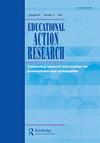Connecting artfully in the context of the emerging climate crisis
IF 1.2
Q3 EDUCATION & EDUCATIONAL RESEARCH
引用次数: 0
Abstract
ABSTRACT The climate crisis is not (merely) a problem of science but also, pre-eminently, a moral and ethical one. Humans alive today are the first with overwhelming data that our modern, industrialised, high-carbon-consumption ways of living threaten the biosphere we depend on, and perhaps the last with meaningful opportunity to avert climate disaster. However, knowing how to act is not straightforward. This crisis requires the application of our scientific ingenuity and also that we build our individual and collective psychological, emotional and moral responsiveness. Whilst not replacing technological innovations or political reform, there is a vital role for artful actions that locate and re-connect us, to ourselves, to our context-in-nature, to each other. In artful action attentiveness to the subjective, committed personal experience is fundamental and so artful inquiry often begins with first person work, which can then be adapted to address communal concerns. In this article I present outcomes from a sustained cycle of first-person inquiry, which used a structured framework of walking and ‘compressed writing’ that I term poetic charting. My aspiration is to develop simple exercises that might support an ethic of connectedness and participation for moral action appropriate to the challenges facing the present climate breakdown generation/s.在新出现的气候危机背景下巧妙地连接
摘要气候危机不仅仅是一个科学问题,更重要的是一个道德和伦理问题。今天活着的人类是第一个有压倒性数据表明我们现代、工业化、高碳消费的生活方式威胁着我们所依赖的生物圈的人,也许也是最后一个有意义机会避免气候灾难的人。然而,知道如何行动并不简单。这场危机需要我们运用科学智慧,也需要我们建立个人和集体的心理、情感和道德反应能力。虽然不能取代技术创新或政治改革,但巧妙的行动在定位和重新连接我们、我们自己、我们的自然环境和彼此方面发挥着至关重要的作用。在巧妙的行动中,对主观的、坚定的个人体验的关注是基本的,因此巧妙的探究通常从第一人称工作开始,然后可以调整第一人称工作来解决共同的问题。在这篇文章中,我展示了第一人称探究的持续循环的结果,该循环使用了行走和“压缩写作”的结构化框架,我称之为诗意图表。我的愿望是制定一些简单的练习,这些练习可能会支持一种联系和参与的道德行为,以应对当前气候崩溃的一代人所面临的挑战。
本文章由计算机程序翻译,如有差异,请以英文原文为准。
求助全文
约1分钟内获得全文
求助全文
来源期刊

Educational Action Research
EDUCATION & EDUCATIONAL RESEARCH-
CiteScore
3.10
自引率
8.30%
发文量
48
期刊介绍:
Educational Action Research is concerned with exploring the dialogue between research and practice in educational settings. The considerable increase in interest in action research in recent years has been accompanied by the development of a number of different approaches: for example, to promote reflective practice; professional development; empowerment; understanding of tacit professional knowledge; curriculum development; individual, institutional and community change; and development of democratic management and administration. Proponents of all these share the common aim of ending the dislocation of research from practice, an aim which links them with those involved in participatory research and action inquiry. This journal publishes accounts of a range of action research and related studies, in education and across the professions, with the aim of making their outcomes widely available and exemplifying the variety of possible styles of reporting. It aims to establish and maintain a review of the literature of action research. It also provides a forum for dialogue on the methodological and epistemological issues, enabling different approaches to be subjected to critical reflection and analysis. The impetus for Educational Action Research came from CARN, the Collaborative Action Research Network, and since its foundation in 1992, EAR has been important in extending and strengthening this international network.
 求助内容:
求助内容: 应助结果提醒方式:
应助结果提醒方式:


